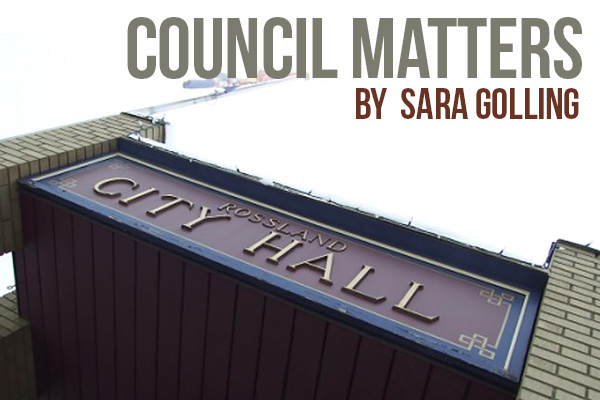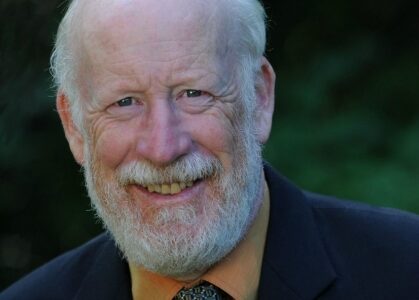Washington Street Re-design: Charette Date Set
Rossland City Council: One evening, three meetings
1. Committee-of-the-Whole Meeting, September 14, 2015, 5:00 pm
Council members present: Mayor Kathy Moore, Councillors Aaron Cosbey, John Greene, Andy Morel, Andrew Zwicker, and Marten Kruysse.
Absent: Councillor Lloyd McLellan is visiting family in Chicago.
Presentation:
Architects Chris Fairbank and Thomas Loh presented information on the Miners Hall renovation and restoration project, and answered questions from Council. Loh was hired in 2012 to design a renovation concept for the Miners Hall, and has worked on other projects in the region, such as the Gathering Place at Selkirk College and Touchstones Nelson.
Fairbank has been working in the area since 1978. He spoke about different methods of obtaining a contractor or contractors to do the work and issue tenders; what a cost consultant would do; justifying the payments on a monthly basis; and inspection of progress on the most cost-effective basis. He estimates the construction would take eight months.
Cosbey confessed he had never heard of a cost consultant before, and asked whether the City should expect cost increases as the project moves forward; Fairbank said that it should come in at very close to the estimated amount, as construction costs have been holding steady.
Moore asked if there would be any “green” features included in the retrofit; the firm has done some work with green technology in other designs. Fairbank spoke of heat recovery from the outgoing air in the ventilation system being “fairly standard” now. But, “air” will be supplied to the attic but not to the other floors, as they are grandfathered as of the date of last renovation — 1980. The chimney will be removed as it passes through the attic, but whether or not it will be removed for the rest of the building was unclear. Some windows will be replaced, and others will have storm windows added. Fairbank would be doing the site inspections. Responding to a question about the original protruding balcony design, Fairbank and Loh acknowledged that the original balcony was a design error and had to be removed fairly quickly after the original build; the implication was that they would advise not repeating that error, for controlling seepage of moisture into the structure and also public safety and legal liability. Mitchell Bickmore asked if it was possible to add something that would enable some means of painting the building without building full scaffolding for the entire structure. There was no obvious solution to that problem.
The Committee of the Whole meeting adjourned at 5:45 pm, and the next meeting was called to order at 6:00 pm:
2. Public Hearing on an application for a zoning amendment for the lots at 2025 and 2035 First Avenue (behind Better Life Fitness) to allow a change from Commercial to R-3 Multiple Family Residential zoning. No one spoke about the application.The Public Hearing adjourned at 6:03, and Moore called the next meeting to order immediately.
3. Regular Council Meeting
Public Input Period:
Jackie Drysdale spoke about the Heritage BC conference and thanked Council for a $1000 contribution toward the conference. She asked that the funds go toward the AV equipment, and secondly toward the rental of the Miners Hall. Moore explained that it was up to the Heritage Commission to use the funds as it wished. Drysdale also said that the conference keynote speaker is from Heritage Canada; and that the sessions are $35 each for interested local residents who don’t wish to attend the entire conference. There will also be some events that are free for anyone to attend, such as the walking tours.
Drysdale also spoke at length about the signage at Pioneer Park. It went up in 1997, and has fallen into disrepair. Tourism Rossland has proposed to use some RMI funds to replace the signage. Drysdale also delivered a critique of the signage recently installed at the corner of Columbia and St. Paul.
Laura Petit also spoke about signage; she expressed disappointment with Council’s decision to reallocate funding from a gazebo to signage, as it might be better used for some other purpose. Cosbey explained that the decision to put it toward signage was a temporary way to keep the funding in the budget, and the decision may be changed easily in the future. Asked if she had any other concerns, Petit responded, “That’s it, I’m done.”
“I’m not done,” Drysdale quipped. “Oh yes you are,” Moore riposted, and there was general laughter.
Delegation from Lower Columbia Initiatives Corporation (LCIC): Terry Van Horn described LCIC’s new strategic direction and initiatives. Their idea is to move from “supporting” to “driving” economic development in our region. Strategies include attracting new investment by promoting the competitive advantages of existing assets and lifestyle. “Link Local” is a regional professional registry, to help people find a local professional to do their job. “Invest Kootenay” will include “Imagine Kootenay.”
Another strategy is to identify industrial lands available in local communities, create a plan and market the opportunities they provide. (To explore the LCIC website, click here.)
Kruysse asked whether the Business Retention and Expansion (BRE) reportis available; Van Horn said yes, it’s on the website. Moore thanked her and Council moved to the next delegation.
Delegation from Fireline Consulting: Don Mortimer presented to Council on the Community Wildfire Protection Plan. He addressed the report prepared about Rossland and its fire risk and recommendations made in 2013. (To see that report, click here.) Moore wondered how many of the recommendations made have been implemented since 2013. Mortimer went through his presentation briskly; he mentioned that Rossland has done a very good job of reducing fire hazard around the city perimeter by means of “fuel treatment” — reducing the amount of flammable material littering the forest floor on public land around Rossland; and he hopes that some funding may become available for treating our watersheds, as fire in our watersheds would be “catastrophic.” He pointed out that climate change is expected to increase wildfire risk, and people must ramp up their prevention and preparedness efforts, both as individuals and as communities.
Unfinished Business: Revitalization Tax Exemption Application from WCH Holdings Ltd. (the new hotel under construction at Red) for 2016. There was a motion to approve the application. Council discussed the effect of the bylaw, and what the City has done on previous applications. Cosby pointed out that the bylaw specifies what must be done — “we’ve tied our own hands” — until such time as the bylaw gets revised. Moore pointed out that this investment is a good thing for the community, and the revitalization tax exemption bylaw provides a “small” welcome gift from the City. Zwicker was interested in imposing some conditions on the exemption. Cosbey repeated that our bylaw limits our ability to do that, and we have had legal advice to that effect. Kruysse said we should keep it simple, instead of trying to impose conditions — there are other means to accomplish conditions. The motion to grant the revitalization tax exemption to WCH Holdings CARRIED.
Recommendations from Staff for Council decision:
(a) Motion: that Rossland City Council supports the applications to the Provincial Fuel Management Working Group, 2015 Strategic Wildfire Prevention Initiative funding opportunities program. This would require the City to put in $7,500 to obtain funding from the Province — the Province would be paying 90% of the cost. Kruysse questioned whether the City should be putting funds toward this and other ad hoc items, as they add up, but the motion CARRIED unanimously.
(b) Motion: that Council approves and commits the withdrawal of $45,000 from the General Capital Project Reserve Fund in the 2016 budget for the Museum / Visitors Centre, as that amount had been paid into the fund for that purpose. The motion CARRIED unanimously.
(c) Motion: that Council approves the 2016 Washington Street Surface Design drawings and sets a design charette event for September 23, 2015. Cosbey commented that he is delighted at the thought that has gone into the re-design and that “this is a great basis for discussion.” Kruysse regards this as a public engagement initiative. He says he thinks there is a lot of concern in the community about potential changes for Washington Street — and he hopes that the design is not a “done deal” and that the City will actually listen to the public and take their ideas into account. Interim Chief Administrative Officer Mike Maturo made it clear that the design is up for discussion and that input will be considered. He also made it clear that one of the primary purposes of reconfiguring the street is to slow traffic down for safety reasons — not to make speeding easier.
The motion to approve the surface design drawings for public discussion, and to set a charette for September 23, 2015, CARRIED unanimously.
(d) Motion: that Council make a decision on the Pioneer Park renaming request by the Heritage Commission, and signage approval. Greene likes the idea of the change back to Esling Park, as he grew up with that name. The motion to change the name to Esling Park and approve signage CARRIED unanimously.
(e) Motion: that Council approve Ms. Jen Ellis as the consultant to organize Council’s 2016 – 2018 Strategic Planning Session; the motion CARRIED unanimously;
Another motion to approve an increase of $3300 to the Strategic Planning Budget to bring it to a total of $5000 CARRIED unanimously. In discussion, Kruysse was concerned about the number of ad hoc decisions Council is making that add small amounts of expenditure. Acting Chief Financial Officer Lois Hunter said “we could pay for it from accumulated surplus.” Kruysse also noted that the strategic planning is absolutely something that Council must do.
Another motion to approve entering into a contract with Jen Ellis CARRIED unanimously.
Bylaws:
(a) The motion that Council give third reading to Bylaw #2597 to rezone the lots at 2025 and 2035 First Avenue from Commercial use to Multiple Family Residential CARRIED unanimously.
(b) There was a motion that Council give first, second and third readings to bylaw # 2598, to amend the financial plan; Cosbey asked why the engineering costs for the Miners Hall renovations weren’t in the original financial plan; Maturo reminded Council that the information wasn’t available earlier. Council was unsure whether the $91,000 in the proposed amendment was “new money” being added to the plan, or whether it had already been allocated in the budget. The motion was amended to add the amount discussed earlier for strategic planning and for the City to contribute for wildfire protection, too. The amended motion CARRIED unanimously.
(c) A motion that Council give first, second and third readings to Bylaw # 2599, for permissive tax exemptions for 2016 to 2018 failed; no one voted in favour of it, following discussion about the consequences of a change of ownership or use of a property. Hunter is waiting for an answer to that question from BC Assessment. Cosbey proposed an amendment to the bylaw that requires Council to review a property’s tax status if the ownership or operation changes, and a motion referring the bylaw back to staff to make that change CARRIED unanimously.
(d) A motion that Council give first, second and third readings to Bylaw # 2600 to set water rates resulted in a long and at times confusing discussion, but ultimately, Council DEFEATED the motion. I referred to the Deputy Corporate Officer’s minutes to clarify the following decisions, so they are subject to correction, along with the minutes:
— Council then RESCINDED a motion from an earlier meeting that would have resulted in new water and sewer rates becoming effective as of October 1, 2015.
— Then, a motion to defer a decision on the new water and sewer rate bylaws CARRIED;
— And another motion to direct staff to amend the charts for new water and sewer rates CARRIED.
During discussion on those items, Greene noted that taxes never seem to go down even when a service that used to be subsidized by taxes becomes self-supporting. Moore agreed, explaining that the funding that subsidized the service could then be used to fund our other crumbling infrastructure which has been underfunded for decades. Kruysse expressed concern about the rate of change proposed, and its effect on less-well-off residents. Council wants a chart for water and sewer rates that they can take to the public.
Requests Arising From Correspondence:
Two motions that the Regional District needs approved by Rossland and other local communities, enabling the change of ownership and operation of the Trail airport, CARRIED unanimously.
Cosbey noted that the BC government’s Air Quality program offers support to do a woodstove exchange to replace smoky old stoves with new, low-emissions units to reduce the damage to our health from exposure to smoke, and suggested that the City participate. He made a motion to direct staff to apply for Rossland to participate in the program, and it CARRIED unanimously.
Cosbey also moved that the City contribute $100 per exchange. He pointed out that a new stove burns more efficiently and makes less air pollution. Moore noted that this is one of Columbia Basin Trust’s suggested actions for a community to do to improve air quality and mitigate climate change, and mentioned that only a small number of people took advantage of the program last time Rossland offered it. Zwicker was concerned that it’s a subsidy to the rich — to people who can afford a new stove in the first place. The motion CARRIED with Kruysse and Zwicker opposed.
Moore noted that the City will not open the road through Nickelplate Park this winter. She also reported on the Community Voters Challenge: an effort to raise the voter turn-out for the upcoming federal election in the region. Council agreed that Rossland should take part. The prize for the community with the highest percentage of eligible voters who turn out to vote could be — if organizers are successful in arranging it — getting Rick Mercer to come to the winning community to do a show.
Council adjourned the meeting, and your reporter walked home in the dark and drizzle, feeling cold and hoping that every single eligible Rosslander will turn out for the federal election on October 19 and vote — to improve the health of our national governance, of course, not only in hopes of having Rick Mercer visit us again, just in case he should happen to agree.
























